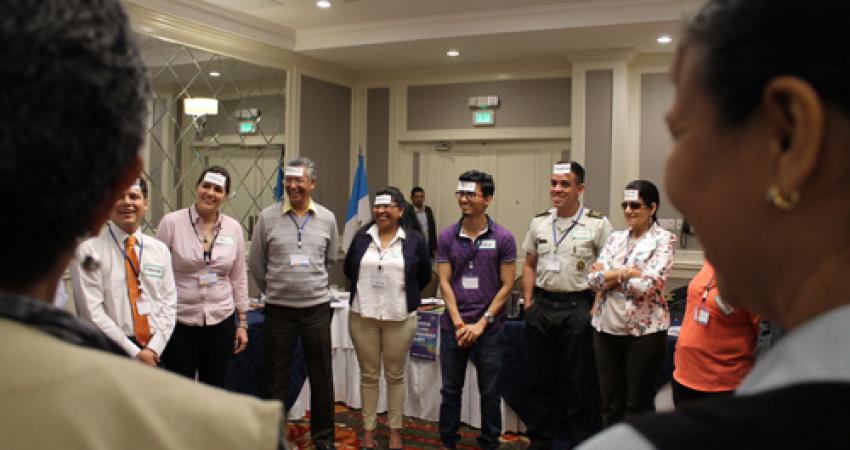IOM, civil society and governments of Mesoamerica discusses the challenges to protect LGBTI Migrants

Guatemala City. More than 50 LGBTI activists, government officers, and representatives from non-governmental organizations from the seven countries in Mesoamerica met on from the 13th to 15th of June in Guatemala to strengthen their capacities and discuss joint strategies for the defense and promotion of the human rights of migrant lesbian, gay, bisexual and trans populations.

The Regional Workshop on Migration and LGBTI populations included a training on the normative framework and the actions to foster the protection of migrants LGBTI people. It also served to jointly analyze the advances and challenges in the region, and to promote the cooperation between actors to improve the protection of this part of the population.
The increase in cases of violence against LGBTI people in the past years has been significant. According to the Inter-American Commission on Human Rights (CIDH), during the first months of 2017 41 crimes against LGBTI people have been registered in the Americas. Only in El Salvador, 19 crimes affecting LGBTI people have been registered.
The risks and discrimination faced by LGBTI people increasingly foster their migration in search of protection as well as opportunities. In addition, gender identity and sexual orientation often has a negative impact on migratory experiences.
The attention to the specific needs of LGBTI people during the migration cycle is still a challenge, as a variety of factors hinder the full exercise of their rights as migrants in Mesoamerica. One of such factors is the lack of information and training on the subject.
“This topic is of utmost importance for IOM since we are conscious of the homophobic and transphobic climate in our countries that often translates into family, community and even institutional violence. We are also aware that within this vulnerable population, transgender women are the most exposed to risk. All of these violence patterns, that range from threats and insults until death, oblige LGBTI persons to search for protection in other countries through irregular migration, which increases their vulnerability towards trafficking in persons networks and other criminal organizations”, said the IOM Chief of Mission for El Salvador, Guatemala y Honduras, Jorge Peraza Breedy.

The workshop allowed to identify the types of migration in the region, reflect upon the vulnerabilities of LGBTI persons, and learn about the bases of international protection and mechanisms for the protection of human rights, and their specific implications on this part of the population. In addition, based on the presentations made by representatives from UNHCR, IOM and the Inter-American Court for Human Rights, a frame to revise the advances, challenges and opportunities in terms of protection of LGBTI migrant persons in the region was promoted.
During the third day, a space was enabled to jointly develop agreements between institutions and LGBTI organizations. As a result, each country now has a bi-annual action plan that identifies priority actions regarding the protection and assistance of migrant LGBTI persons.
Among other actions, the countries committed to continue the training on the subject within the participating institutions, create protection mechanisms from Human Rights activists, promote the instalment of national work tables on the migrant LGBTI subject or incorporate the subject in the already existing coordination forums, and include the LGBTI variant in registry systems which would allow the generation of information that affects public policy related to the subject at hand.
At the regional level, the participants remarked the need to enable safe spaces for migrant LGBTI persons in migrant apprehension centres and shelters. Likewise, they proposed to create a regional directory including all actors linked to the subject in order to provide better assitance, and develop a study that characterizes migrants LGBTI persons in the region and a methodological guide for the attention of migrant LGBTI children and adolescents. Finally, the group agreed on the need to integrate and position the LGBTI migrant subject in the agenda of regional coordination spaces linked to migration, such as the Regional Conference on Migration (RCM).
This is the second regional workshop of its kind implemented by the International Organization for Migration (IOM) through the Mesoamerica Program. In its first edition (2016), the space allowed the formation of the Mesoamerican Network for the Protection and Assitance of migrant LGBTI persons, a project that seeks to unite the efforts of organizations that defend human rights to develop an articulated regional response for the attention of the multiple needs that this part of the population faces.
The Mesoamerica Program ‘’Strengthening the capacities for the protection and assistance to migrants in situations of vulnerability’’, is financed by the Office of Population, Refugees and Migration of the Department of State of the United States.
